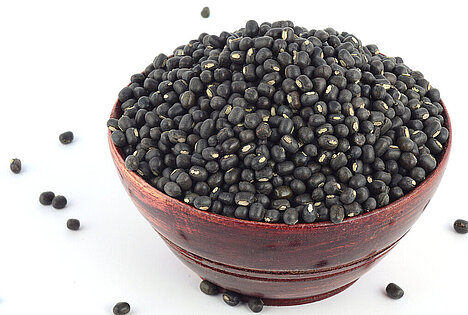Broad bean

The urd bean, also known as the lentil bean, is a plant species from the legume family that is mainly cultivated in South and Southeast Asia. It is closely related to the mung bean, but differs in its dark color and white interior. The urd bean is an important part of Indian cuisine and is used in various dishes such as dal, vada, idli and dosa. But can your dog also benefit from this nutritious and delicious legume? In this article, you will find out what the urd bean can do for your dog and what you should pay attention to when feeding it.
What is the common bean?
The urd bean is an annual plant that can grow up to 90 cm tall. It has three-part leaves and yellow flowers that are found in small clusters on the stems. The fruits are rough, hairy pods containing four to ten seeds. The seeds are shiny, square and rounded at the ends. They are about 4 mm in diameter and dark green to black in color. The inside of the seeds is white and has a concave hilum (navel).
The urd bean has been cultivated on the Indian subcontinent for around 4000 years and is now widespread in many tropical and subtropical regions. It is mainly cultivated in India, Pakistan, Bangladesh, Sri Lanka, Myanmar, Thailand and Indonesia. The ancient bean is an important source of protein for people in these countries and is often combined with rice or other cereals.
Why is the ancient bean good for your dog?
The urd bean has many health benefits for your dog if you prepare it properly and feed it in moderation. Here are some reasons why you should give your dog urd beans from time to time:
- Urd beans are rich in plant-based protein, which is important for your dog's muscle building, cell regeneration and immune system. Half a cup of cooked runner beans contains about 10 grams of protein.
- The urd bean is also a good source of fiber, which aids your dog's digestion and makes him feel full. Fiber can also help regulate blood sugar levels and reduce the risk of diabetes.
- The urd bean contains many vitamins and minerals that are essential for your dog's health. These include vitamin A, B vitamins, vitamin C, calcium, potassium, iron, selenium, fluorine, zinc and magnesium. These nutrients support the function of your dog's eyes, skin, coat, bones, nerves, heart and blood.
- The urd bean has antioxidant properties that can protect your dog's body from free radicals. Free radicals are harmful molecules that can be caused by pollution, stress or ageing. They can cause cell damage and promote chronic diseases such as cancer or arthritis.
- The urd bean can also have an anti-inflammatory effect and relieve pain or swelling in your dog. This can be particularly helpful for dogs with joint problems or skin conditions.
How do you feed your dog broad beans?
There are a few things to bear in mind before giving your dog urd beans:
- You should only feed your dog cooked urd beans. Raw urd beans contain the substance phasin, which is toxic to dogs. Phasin can lead to gastrointestinal problems, anemia or even death. Phasin is destroyed by cooking and the urd beans become digestible.
- You should not give your dog spiced or salted broad beans. Spices such as onions, garlic, chili or turmeric can be harmful to dogs. Salt can lead to dehydration, kidney problems or high blood pressure. Give your dog only unseasoned and unsalted urd beans or cook them in water without additives.
- You should only give your dog small amounts of broad beans. Too many urd beans can lead to bloating, abdominal pain, diarrhea or vomiting. This is because dogs have difficulty breaking down the starch and oligosaccharides in urd beans. These carbohydrates are fermented by bacteria in the gut and produce gas. Give your dog no more than a quarter cup of cooked urd beans per day and mix it with his normal food.
- You should only give your dog urd beans occasionally. Urd beans are not a substitute for meat or other animal proteins in your dog's diet. Dogs are carnivores by nature and need animal protein to get all the essential amino acids. Plant protein is not as complete and can lead to deficiencies if it is the main source of protein. Only give your dog urd beans as a supplement or variety to his usual food.
The urd bean is a healthy and versatile legume that you can feed your dog in moderation. It is rich in vegetable protein, fiber, vitamins, minerals and antioxidants. It can support your dog's digestion, immune system, cellular health and reduce inflammation. However, you must make sure that you only give your dog cooked, unseasoned and unsalted urd beans and do not use them as the main source of protein.
If you notice any signs of hypersensitivity or poisoning in your dog, you should see your vet immediately. We are not a substitute for a vet, but we try to be as accurate as possible. Every dog reacts differently and we recommend you get a second opinion or consult your vet if in doubt.
Stay healthy and take good care of your four-legged friend!😊